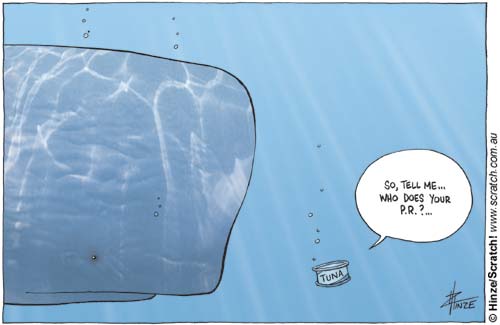After much humming and haring… I’ve finally gathered up the gumption and kicked off Greenfish Bluefish (GFBF)
Now that I’ve started I don’t know why I didn’t earlier…
Greenfish Bluefish will be my little soapbox for marine resource and food production discussion. For marine and fisheries related politics, political economy, development, policy, law, food security, free-market environmentalism, international relations and general commentary featuring my opinionated slant that food production is necessary, and noble.
I will do my best to make sure Greenfish Bluefish resists (where appropriate) the ‘follow the leader’ urban environmental groundswell where for the most part, consumers interpret ‘sustainable utilisation‘ to mean cessation and preservation. And look into resource management decisions as much and as objectively as I can (and of course as opinionated as possible).
After all, in my opinion, the unquestioned acceptance of (what in my experience is largely ad hoc) pro-conservationist/preservationist dogma, which is disseminated mostly by those demographically distant from the process of food production – is (in my opinion) one the greatest threats to food security.

Something Fishy (Source PR Watch)
http://www.prwatch.org/node/6401
The production of food is a horrible, destructive business
But, ultimately for us to eat, something has to die. At the end of the day something (a cabbage, a carrot, a cod or a cow) has to give up its life in order to extend ours.
The truth is, in order for us to procure or produce food, the natural environment needs to be impacted and changed, and often negatively.
However, for me the real tragedy here is not the ‘circle of life’ of which we are part, it is that most of us are so removed from the ‘real’ provenance of our food, that we lose sight of the context of food production, and so our perspective. This is forgiveable when the reality is that the majority of us obtain our food from the urban supermarket, mass produced and commodified in clean cling wrapped polystyrene containers or carefully displayed in colourful constructed piles. After all, we have consciences – which are sublimely subjective and uncompromising – that must be assuaged.
But we have to be on guard that the line between our human subjectivity and the objectivity of food production, is not so defined and uncompromising that we lose sight of the context surrounding the procurement of food… or we might end up vilifying the very guys who feed us… because they impact and change the natural environment.
Green Fish Blue Fish will strive to acknowledge the more ‘basic” aspects of food production. It will discuss food production with emphasis on wild seafood capture, responsible and efficient aquaculture and marine environmental impact – and will charter sustainable utilisation and best practice in its most conservative aspect. Where sustainable utilisation means:*
Use that meets the needs of the present without compromising the ability of future generations to meet their own needs.
But also recognising and holding food producers to two concepts:*
the concept of ‘needs‘, in particular the essential needs of the world’s poor, to which overriding priority should be given; and the idea of limitations imposed by the environment’s ability to meet present and future needs.
So what is Greenfish Bluefish’s perspective?
Green Fish Blue Fish prioritises feeding people over unquestioned preservation.
- It is estimated that by 2015 there will be around 7.2 billion people on Earth.
- By 2030, according to the United Nations (2007) State of World Population Report the proportion of the World’s population that will be urban is projected to reach 60 percent by 2030 (see figure). The proportion of the population of people living in urban areas (the urban share) is likely to rise from 75 percent to 81 percent in more developed countries between 2007 and 2030, and from 44 percent to 56 percent in less developed countries.
- This means that around about now, in developed countries, almost 3 out of every 4 people lives in an urban area and therefore, consumes food rather than produces it.
It has long been my opinion, that of all occupations, those who feed us are the most noble… So long as they do so without compromising the ability of future generations to use those natural resources, and so long as they realise that utilisation also includes non-use and preservation.
But this is another story… One that we can discuss here perhaps.
This video clip below although overly simplistic, is a very good over-view of the problem of food security in relation to Japan.
*United Nations. 1987.“Report of the World Commission on Environment and Development.” General Assembly Resolution 42/187, 11 December 1987. Retrieved: 2007-04-12
